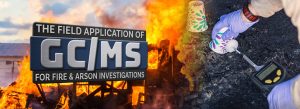← Back to the HHRRC Special Initiative The Humanitarian and Human Rights Resource Center (HHRRC), an organization within the American Academy of Forensic Sciences (AAFS) supported by the National Institute of Justice’s (NIJ) Forensic Technology Center of Excellence (FTCOE), hosted…
Category: Discipline (page 29)
Development of an Extraction Technique for Ignitable Liquid Residues (ILR) in the Field using Capillary Microextraction of Volatiles (CMV) and Person-Portable GC-MS
← Additional Portable Instrumentation for On-Scene Fire Debris Analysis Resources Date February 2022 Overview The work in this report is an extension of the capillary microextraction of volatiles (CMV) application (M. Torres et al., 2020) by Florida International University, reported…
Evaluation of Capillary Microextraction of Volatiles (CMV) Coupled to a Person-Portable Gas Chromatograph Mass Spectrometer (GC–MS) for the Analysis of Gasoline Residues
← Additional Portable Instrumentation for On-Scene Fire Debris Analysis Resources Publication Forensic Chemistry, March 2022 Authors Michelle N. Torres | Florida International University José R. Almirall | Florida International University Abstract A novel dynamic headspace extraction device, the capillary microextraction of…
Capturing Key Research Outcomes Using Short Video Vignettes: A Guidance Document
Date February 2022 Author David Matthew | David Matthew LLC, Wichita, Kansas Overview This document outlines the process of designing engaging video vignettes to disseminate results from complex research projects in a manner that is easily digestible by practitioners. More…
The Field Application of GC/MS For Fire & Arson Investigations Video Series
← Additional Portable Instrumentation for On-Scene Fire Debris Analysis Resources Overview The purpose of this project was to design engaging video vignettes to disseminate results from a complex research project. The project team developed a guidance document that specifically describes…
Portable Instrumentation for On-Scene Fire Debris Analysis
Overview The use of field portable instrumentation, including portable gas chromatography mass spectrometry (GC/MS) and photoionization detection, for on-scene fire debris analysis can allow for more efficient scene processing and a reduction in the amount of evidence sent for confirmatory…
Just a Prosecutor’s Perspective on At-Home Kits
Original Release Date: February 18, 2022 In episode seven of our Perspectives on At-Home Sexual Assault Kits season, Just Science sat down with Patti Powers, an attorney advisor at AEquitas and a former senior deputy prosecuting attorney in Washington state,…
Forensic Analysis of Cosmetics
This webinar originally occurred on February 17, 2022. Duration: 1 hour Overview What is in a cosmetic? Cosmetics are a huge part of many people’s daily routine, but the science behind these quick fixes is still somewhat of a mystery…
Virtual Workshop: Understanding Sexual Assault Trauma and Considerations for Conducting a Trauma-Informed Interview
Overview Due to the successful response and engagement received from the Just Science podcast episode titled “Just Trauma-Informed Victim-Centered Interviewing” from the 2021 Research and Considerations for Sexual Assault Cases season, the National Institute of Justice (NIJ) and the Forensic…
A Landscape Study of Electronic Case Management Systems for Medical Examiners and Coroners
Date February 2022 Overview Medical examiner and coroner (ME/C) offices sit at the nexus of forensic sciences and public health. These offices play a key role in the investigation of suspicious, unexplained, or unexpected deaths, dissemination of important data to…










